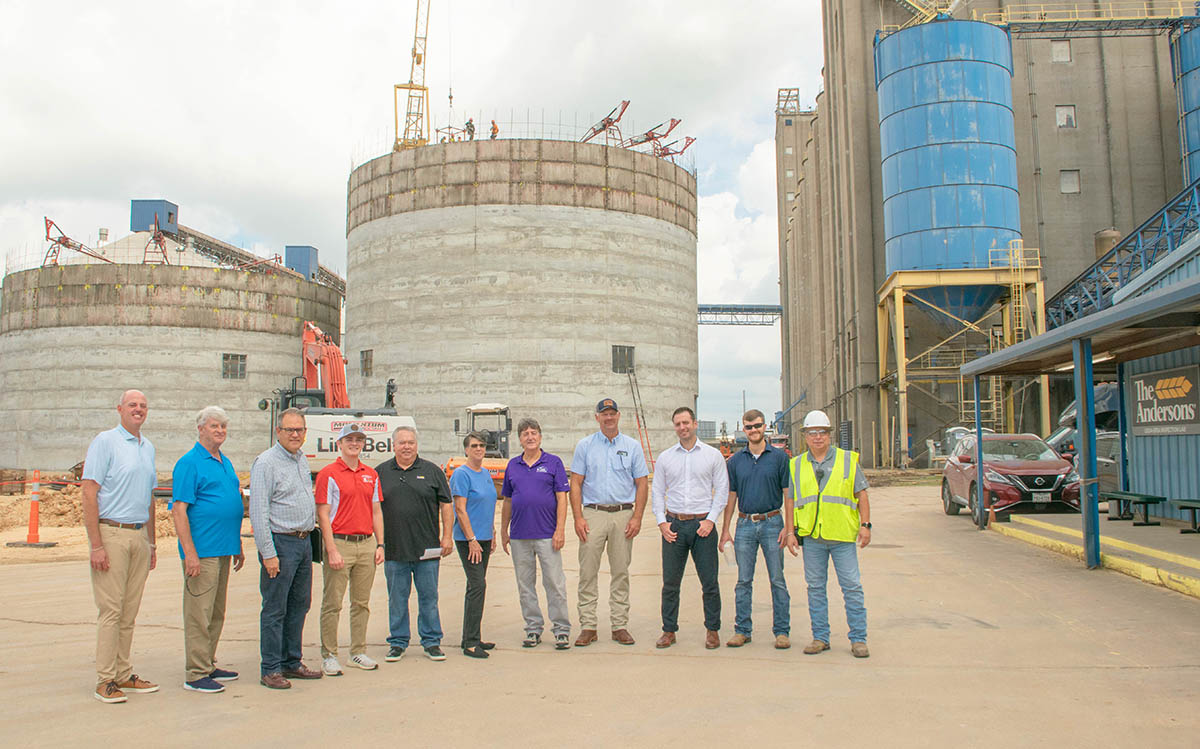
(Photo: Iowa Soybean Association / Bethany Baratta)
Backing infrastructure to move more meal abroad
November 26, 2025 | Bethany Baratta
The expansion of soybean processing in the U.S. has been driven by the growth in demand for renewable diesel. For the first time ever, biofuels use of soybean oil has surpassed oil used for exports or through domestic use in food consumption. As production of soybean oil grows, so, too, does soybean meal production.
Understanding the reserves and the vital role export markets have on the U.S. soybean industry, the Soy Transportation Coalition (STC) found an opportunity to grow shipping prospects of soybean meal through the Port of Houston.
On a sun-drenched day in late September, STC ceremoniously presented a $275,000 check to The Andersons, Inc. for the company's expansion project at the Port of Houston. Once completed in the first quarter of 2026, the expansion will enable soybean meal exports from the facility.

"It's another way of thinking to get soybeans shipped," says Mike Koehne, STC chairman and director for the Indiana Soybean Alliance. "This will open up some more markets — different markets — which is important."
The funding will be used for research, analysis, pre-engineering, and design expenses associated with the facility expansion at the Port of Houston. The Andersons, the owner of the facility, will assume the costs of the actual construction of the project, which is underway.
"We sincerely appreciate the opportunity to work with soybean farmers on this important investment," says Matt Dvorak, Houston business manager at The Andersons. "As domestic soybean crush increases, we are identifying new opportunities for the export of soybean meal via our Houston facility. We look forward to working with the Soy Transportation Coalition and the broader soybean farmer community on this project, which will help connect U.S. soybean meal with international customers."
The Houston facility has a storage capacity of 6.3 million bushels, and exports more than 2 million metric tons of grain annually. The upgrades will support storage for 22,000 metric tons of soybean meal. Additional upgrades will include a new conveyance system to seamlessly transport goods from storage to the ship loaders. A new ship loading tower will increase efficiency and speed of loading.
Soybean meal storage at the port won't look like it does in Iowa, Kansas, Minnesota, Missouri or Nebraska, where the meal will originate. Storage at the export facility is meant to be short-term—soybean meal delivered via BNSF Railway or Union Pacific Railroad will be stored temporarily, then moved via conveyance from storage to ship loaders. The identified markets for the Houston export terminal include Middle East/North Africa, the Caribbean, Latin America, and Asia.
When it comes to moving U.S. soy to market, Mike Koehne, Indiana farmer and chairman of the Soy Transportation Coalition (STC), knows the value of good infrastructure and smart investments. Drawing on more than three decades of farming — and nearly two decades running a trucking business — Mike shared his thoughts on why this new port project, market diversification, and transportation improvements are vital to the soybean industry.
Here are five key takeaways from Mike:
1. Expanding meal export opportunities
- The investment at Port of Houston is a positive step to boost soybean meal exports.
- It reflects a shift from shipping whole soybeans to exporting more value-added soybean meal, helping reach new and diversified markets.
2. Diversification is key
- Diversification is key on the Koehne farm, too. The Koehnes raise high oleic and food-grade soybeans, which they ship by container to Japan and Taiwan. They also grow corn for the Kentucky bourbon market and for dry millers in Japan.
- In addition to soy and corn, Mike and his family raise cattle and grow hay. For the last 20 years, they have operated a farm drainage business.
3. Infrastructure investment keeps U.S. soy competitive
- "We've got to have that infrastructure to get our product to the coastal regions so we can be competitive in the international markets. So, infrastructure, whether it's inland waterways, rail or truck, it's a key part of us delivering products to the world."
- Infrastructure is a two-way street. Efficient transportation helps move both exports and imports, including fertilizer and machinery parts.
4. Cooperation strengthens the industry
- Soybeans from Koehne's first-generation Indiana farm aren't the prime source for the Port of Houston investment, but he supports national investments because they benefit the whole industry.
- "We have to be in partnership with farmers around the country and invest in infrastructure projects because if we can keep their meal from coming into our territory and we can unload their product at this port, then it keeps our markets going. We kind of share that responsibility to help each other out in those aspects."
5. Efficient transportation key to business
- The Koehnes previously owned and operated a trucking company for 19 years. They hauled livestock in 38 of the Lower 48 states. That experience drove home the importance of reliable transportation infrastructure.
- Like the livestock hauling business, well-maintained roads, reliable bridges, accessible rail lines and functioning waterways are vital to soy transportation.
Because the facility at the Port of Houston will result in greater resiliency of both international marketing and the supply chain, the following soybean farmer organizations contributed a total of $275,000 toward the project:
- United Soybean
- Board
Soy Transportation Coalition
- Iowa Soybean Association
- Kansas Soybean Commission
- Missouri Soybean Merchandising Council
- Nebraska Soybean Board
Written by Bethany Baratta.
Back